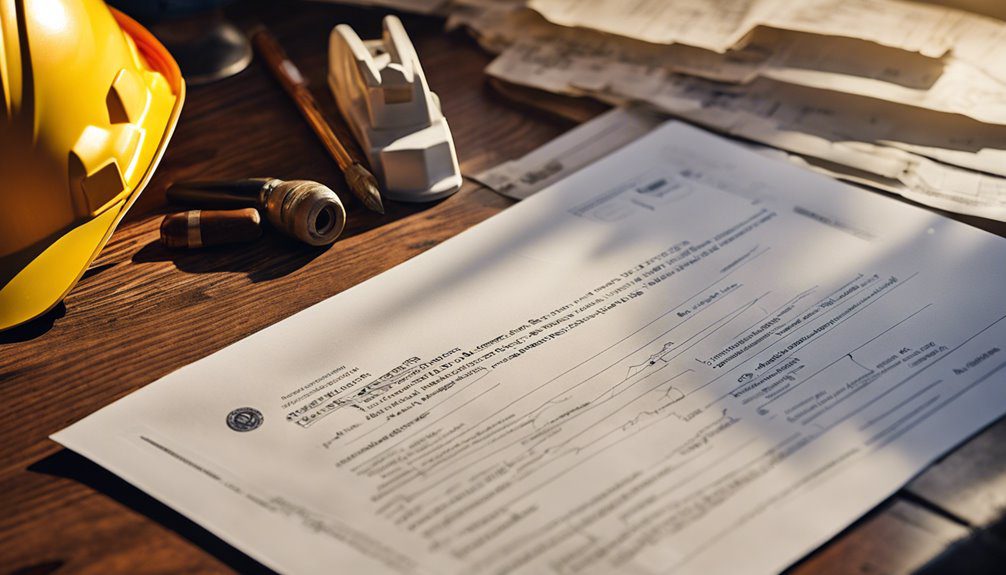When you think about the South Carolina DOT performance bond, it's crucial to understand its role in safeguarding both contractors and project owners. These bonds not only ensure that obligations are met but also provide a layer of financial security in a competitive landscape. If you're navigating the requirements, you'll find that the process involves more than just paperwork; it's essential to grasp the implications of not having a bond. So, what happens when a contractor defaults, and how does that impact everyone involved?
What Is a Performance Bond?

A performance bond is a financial guarantee that ensures a contractor will complete a project according to the terms of a contract. When you engage a contractor, you want to be sure they'll deliver quality work on time and within budget. That's where performance bonds come in. They protect you against the risk of a contractor failing to meet their obligations.
In essence, the bond is issued by a surety company. You pay a premium, which usually ranges from 0.5% to 3% of the contract amount, depending on your contractor's creditworthiness and the project's complexity.
If the contractor defaults or doesn't fulfill the contract requirements, the surety company steps in to cover any financial losses you incur, up to the bond amount.
This arrangement not only safeguards your interests but also motivates contractors to complete their projects as promised. Understanding how performance bonds work can give you peace of mind and help you make informed decisions when hiring contractors. Additionally, the bond helps protect the owner from contractor default, ensuring that projects are completed successfully.
Knowing your investment is protected allows you to focus on the project itself rather than worrying about potential pitfalls.
Importance of Performance Bonds
Understanding the significance of performance bonds can greatly impact your project's success. When you engage in construction or contractual work, these bonds serve as a safety net, ensuring that contractors fulfill their obligations.
You're essentially protecting your investment, as performance bonds provide a financial guarantee that projects will be completed according to specified terms.
Without a performance bond, you may face significant risks. If a contractor fails to deliver, you could end up with delays, financial losses, or worse—an unfinished project.
A performance bond not only provides peace of mind but also enhances your project's credibility. It signals to stakeholders that you're serious about quality and accountability.
Moreover, performance bonds can improve your chances of securing financing. Lenders often view bonded projects as lower risk, making them more willing to provide funds.
This can be crucial for cash flow, especially in large-scale projects. Additionally, ARC bonds ensure contractors fulfill payment obligations to project owners, acting as a form of security against potential defaults.
How Performance Bonds Work

Navigating the mechanics of performance bonds is essential for anyone involved in construction or contractual agreements. A performance bond is a guarantee that ensures a contractor will fulfill their obligations as outlined in the contract. When you secure a performance bond, you're essentially obtaining insurance that promises the project will be completed according to the specified terms.
Here's how it works: you, the contractor, obtain a bond from a surety company, which acts as a third party. This company assesses your financial stability and ability to complete the project. If you fail to meet your contractual obligations, the surety pays the project owner up to the bond's limit. This payment protects the owner from financial loss and motivates you to fulfill your responsibilities.
Once the project is completed successfully, the bond is released. If you default, the surety may pursue you for reimbursement, so it's crucial to ensure you can deliver on your commitments. Additionally, the importance of surety bonds in facilitating business operations cannot be overstated, as they protect all parties involved from potential financial losses.
Understanding this process can help you navigate the complexities of construction projects and provide peace of mind to all parties involved.
SCDOT Bond Requirements
When working on projects funded or overseen by the South Carolina Department of Transportation (SCDOT), you'll need to meet specific bond requirements. These requirements aim to ensure that projects are completed on time, within budget, and according to state standards.
Typically, you'll be required to obtain a performance bond, which guarantees that your work will comply with the contract terms. Before you can begin, you should familiarize yourself with the amount of the bond, as it often reflects the total value of the contract.
You'll also need to choose a surety company that's licensed in South Carolina and has a good financial standing. This part is crucial; if the surety company isn't reputable, it could jeopardize your project.
Additionally, you must submit the bond paperwork along with your bid or proposal. Make sure to review deadlines and submission formats to avoid any delays.
Lastly, remember to keep the bond active throughout the project duration, as any lapse could lead to penalties or project delays. By understanding these requirements, you'll set your project up for success and maintain compliance with SCDOT regulations. Furthermore, the concept of performance bonds is essential in ensuring financial assurance for contractors and businesses.
Types of Performance Bonds

Exploring the types of performance bonds available is essential for anyone involved in SCDOT projects. These bonds serve as a guarantee that contractors will complete their projects according to the terms specified in their contracts.
The primary types of performance bonds you'll encounter include contract performance bonds, maintenance bonds, and bid bonds.
Contract performance bonds protect the project owner by ensuring the contractor fulfills their contractual obligations. If the contractor fails to perform, the bond covers the costs of hiring another contractor to complete the work.
Maintenance bonds, on the other hand, cover any repairs or defects that arise after project completion, typically for a specified period. They ensure the contractor stands behind their work.
Bid bonds are slightly different; they guarantee that the contractor will honor their bid and enter into a contract if selected. If the contractor backs out, the bond compensates the project owner for the difference between the original bid and the next lowest bid.
Understanding these types helps you navigate the requirements and responsibilities involved in SCDOT projects effectively. Additionally, knowing the DoD Performance Bonds can provide insight into how performance bonds function in a broader context.
Benefits for Contractors
Performance bonds offer significant benefits for contractors working on SCDOT projects. First and foremost, these bonds enhance your credibility. When you secure a performance bond, it shows clients and subcontractors that you're financially stable and committed to completing the project as promised. This added trust can lead to more business opportunities.
Additionally, having a performance bond can help you stand out in a competitive bidding environment. Many clients prefer contractors with bonds, as they reduce the risk associated with project completion. This preference can give you an edge over competitors who don't have such coverage.
Performance bonds also provide financial protection. If unforeseen issues arise and you're unable to fulfill your contractual obligations, the bond can help cover any losses incurred by the project owner. This safety net can give you peace of mind, allowing you to focus on the project without worrying about potential fallout.
Lastly, obtaining a performance bond can help you build stronger relationships with suppliers and subcontractors. They're more likely to collaborate with you when they know you have financial backing, ensuring you have the resources needed to complete your projects successfully. Furthermore, these bonds are often required for licensing in many professions, which can further enhance your business's credibility and opportunities.
Risks of Not Having a Bond

Not having a performance bond can expose contractors to significant risks that may jeopardize their projects and reputations. Without this crucial financial safety net, you risk facing costly delays and project disruptions. If you fail to complete the work as promised, clients might turn to other contractors to finish the job, leaving you responsible for any additional expenses incurred.
Additionally, without a bond, you could find yourself liable for damages or penalties if the project doesn't meet the required standards. This can lead to legal disputes, and the costs associated with litigation can quickly escalate.
Your reputation is also on the line; clients may be hesitant to hire you for future projects if they know you lack the financial backing that a performance bond provides.
Moreover, many public contracts, including those with the South Carolina DOT, require a performance bond as a condition of bidding. By not having one, you might miss out on lucrative opportunities, limiting your growth potential. The importance of a performance bond is underscored by its role in ensuring project completion and payment to subcontractors.
Ultimately, the absence of a performance bond can create a ripple effect, impacting not just individual projects, but your entire business's sustainability and success.
Bond Claim Process
When a bond claim arises, understanding the process is crucial for both contractors and clients. The first step you should take is to review the terms of the performance bond. This document outlines your rights and obligations, helping you determine if a valid claim exists.
Next, gather all relevant documentation that supports your claim, such as contracts, invoices, and correspondence. This evidence is vital in substantiating your position.
Once you have your documentation in order, notify the surety company of the claim. You'll typically need to submit a written claim detailing the reasons for the request and including your supporting documents. It's essential to be clear and concise in this communication to ensure the surety understands your situation.
After submitting the claim, the surety will investigate the details. They may reach out to both you and the contractor to gather additional information.
Depending on the findings, the surety may either deny the claim or agree to fulfill it by compensating you for the losses incurred. Remember, staying organized and proactive throughout this process can significantly improve your chances of a successful claim. Additionally, understanding the performance bond requirements in your state can further aid in navigating the claims process.
Conclusion on Performance Bonds

Understanding the significance of performance bonds can greatly impact your construction project's success. These bonds serve as a safety net, ensuring that contractors fulfill their obligations. If they fail to complete the job or meet specified standards, the bond provides financial protection for project owners, allowing them to recover losses and find alternative solutions.
When you're engaging in a project that requires a performance bond, it's crucial to choose a reputable contractor with a strong track record. This reduces the risk of issues arising during the project.
Remember, not all bonds are created equal; understanding the terms and conditions is vital. You should review the bond details carefully to ensure it aligns with your project's needs.
In South Carolina, the DOT requires performance bonds for many projects, reinforcing the importance of compliance. This not only protects your investment but also promotes accountability among contractors.
Conclusion
In conclusion, securing a performance bond for your SCDOT projects isn't just a formality; it's a vital step in protecting your investment and reputation. By understanding the requirements and benefits, you can navigate the bonding process more effectively. Remember, having a bond not only safeguards your interests but also enhances your credibility in the competitive construction market. Don't underestimate the risks of going without one—it's worth the peace of mind and financial security.

